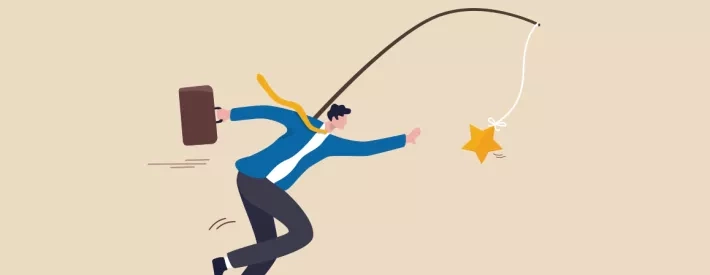How to stick to your goals

Work can be tough sometimes, but if you have career goals in mind, you’ll need to keep going. Here’s how to push through
Lots of my clients approach me wanting to talk about achievement, especially when the thing they hope to achieve seems so out of reach that giving up looks like the only sane option. Whether it’s a distance they want to be able to run, or a promotion they want at work, or a particular financial goal, the spectrum of achievements and targets that I’ve covered with clients is as diverse as the people themselves.
What’s interesting here is that none of these achievers are superheroes. I’ve never been taken aback by their physical presence, their wit or their talent – and yet, of the people who come to me, the vast majority goon to achieve their goal.
What’s more, none of it was achieved using some outdated model of motivation, a cut-and-paste job from a textbook written before the internet existed. I don’t particularly believe in detailed goal-setting anymore (to my shame, I used to teach it to large groups). Instead, I talk about identity and having an identity that suits your goal.
Find yourself
If you want to become a soldier, your head is shaved, you wear a uniform, and you are taught to walk and talk in a certain way. There is, of course, slightly more to it than that, but it’s all intended to change your identity in order to help you achieve that goal.
So, what’s the one sure-fire way to help you stick to your goal? Simple: you need to enjoy it. All of my clients who have gone on to achieve their specific goals have enjoyed the process. They revel in the challenge and are excited by the prospect of adversity.
This isn’t some obscure form of self-harm, terrorising themselves to escape a trauma; nor is it an individual’s desperation for validation and extrinsic reward. No, this is about people who have learned to enjoy the process of working hard for something they want.
You see, the human brain craves a hormone known as dopamine. This craving can make or break individuals, for a complicated set of reasons. Those who may have lacked dopamine in their lives – as a result of, for example, growing up in poverty or having experienced abuse or poor health – are likely to have developed a more extreme set of behaviours in pursuit of that dopamine rush, and are far more likely to seek out instantaneous releases of dopamine.
Remember the old Haribo advert where they put a single sweet in front of a child and told them that if they could resist it for five minutes, then they would get the entire packet? The problem is that children will inevitably eat the one sweet: it’s right there in front of them and they crave it. It’s the same with adults and alcohol, cigarettes, drugs and food. But it isn’t the substance itself that we’re addicted to – it’s the dopamine. Even now, I just chose to finish a Netflix series rather than write this article. I went for the instant relief, so I must now suffer.
Wait for it...
Here’s the incredible thing about dopamine though: we get a far greater spike of it in anticipation of a reward than we do in receipt of it. We’re like children unwrapping presents at Christmas: desperate to get the paper off, only to feel slightly disappointed after. We enjoy anticipating the reward more than we enjoy the actual reward. We have evolved to embrace the process of working towards our goal.
So, what can we take from this? Well, we need to consciously acknowledge that the challenge is what we want, and that we actually enjoy what we do (or at least will enjoy where we’ll get to at the end of the process). Keep that in mind and you’ll never think about giving up again.




